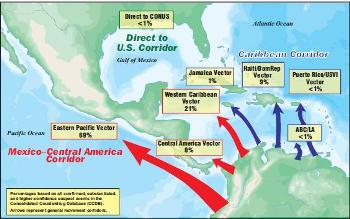The National Drug Intelligence Center is out with its National Drug Threat Assessment 2009. If the authors would read their own words, they would realize they are making a strong argument for ending drug prohibition.
A New Jersey Senate committee Monday approved a medical marijuana bill, sending it to the Senate for a floor vote.
Our web site traffic continues to grow and grow, but that is only one of the things we are doing. Please make a generous donation before year's end to support our programs in 2009.
Two cops are headed for prison in New Mexico, and one in California.
The Buckeye State is on the verge of becoming the latest to ban salvia divinorum.
The ACLU's Northern California affiliate has filed a lawsuit challenging the Shasta County school district's newly-expanded student drug testing policy.
One of Holland's largest banks is washing its hands of the marijuana business, saying it will close down the accounts of coffee shop owners because that's the responsible thing to do.
Plans are afoot in the British Isles to push "problem drug users" into treatment and onto the job market, but the government is going to have to do more, a new report says.
Thanks to some widely publicized busts, despite miniscule use levels, marijuana is sparking concern in Japan. The rhetoric will be familiar, and it provokes the question: Is it time for Nippon NORML?
A new administration in Washington could mean better relations with Venezuela, including renewed cooperation with the DEA, Venezuelan leader Hugo Chávez said Sunday. But cooperation is a two-way street...
Events and quotes of note from this week's drug policy events of years past.
Help build the movement and inform the public by running a StoptheDrugWar.org banner on your web site.
"Am I a Hippie Who Doesn't Understand Politics?," "The Profit Motive for Arresting Marijuana Users," "Vienna UN Drug Treatment Meeting Day Two: The Clockwork Orange Brainwashing Day," "Shooting Down Innocent People in Airplanes Won't Win the Drug War," "Day One at the UN Drug Treatment Meeting -- Slightly More Interesting Than Predicted," "When it Comes to Marijuana Laws, Obama's Website Should be Called Same.gov," "High School Seniors Are Using Lots of LSD This Year," "More on the Ryan Frederick Case," "New Jersey Medical Marijuana Bill Gets Favorable Committee Vote," "Why Should You or Anyone Care About This Week's UN Anti-Drug Meeting?," "The Real Reason Obama Won't Support Marijuana Legalization," "Asserting Your Rights Doesn't Mean You're Getting Away With Something."
StoptheDrugWar.org (DRCNet) is seeking volunteers in the DC area to help with our membership drive; and from anywhere to help with a writing-based project on which work has already begun.
Apply for an internship at DRCNet for this spring (or summer), and you could spend the semester fighting the good fight!
Well, not in so many words. But anyone reading between the lines of the National Drug Intelligence Center's National Drug Threat Assessment 2009 could easily come to that conclusion. The annual report from the Justice Department fiefdom based in Johnstown, Pennsylvania, with its thoroughly inside-the-box approach to the harms associated with drug policy, does not look at the data it is reporting and see the obvious, but its conclusions that violent drug trafficking organizations and street-level drug retail gangs are the gravest "drug threats" to America beg the question of why.
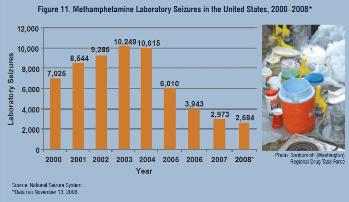
According to the 2009 report: "Mexican DTOs [drug trafficking organizations] represent the greatest organized crime threat to the United States. The influence of Mexican DTOs over domestic drug trafficking is unrivaled. In fact, intelligence estimates indicate a vast majority of the cocaine available in US drug markets is smuggled by Mexican DTOs across the US-Mexico border. Mexican DTOs control drug distribution in most US cities, and they are gaining strength in markets that they do not yet control."
Following close on the heels of the bloody cartels -- 5,000 have been killed in Mexico's prohibition-related violence this year -- are the cartel wannabes: "Violent urban gangs control most retail-level drug distribution nationally, and some have relocated from inner cities to suburban and rural areas. Moreover, gangs are increasing their involvement in wholesale-level drug distribution, aided by their connections with Mexican and Asian DTOs."
While the violence of the cartels and the gangs is deplorable, the NDIC assessment makes no effort to address its root cause: the regime of drug prohibition. Instead it conflates the harms associated with prohibition (fighting the drug trade) with those associated with drug use or abuse.
That conceptual confusion is evident from the very beginning of the annual report. In the first paragraph of its summary, the report observes that: "The trafficking and abuse of illicit drugs inflict tremendous harm upon individuals, families, and communities
throughout the country. The violence, intimidation, theft, and financial crimes carried out by drug trafficking organizations (DTOs), criminal groups, gangs, and drug users in the United States pose a significant threat to our nation. The cost to society from drug production, trafficking, and abuse is difficult to fully measure or convey."
Without pulling apart the harms associated with "trafficking and abuse of illegal drugs," the NDIC is conducting an exercise in futility and propaganda. The harms associated with the growth of powerful criminal organizations thriving under a prohibition regime are an entirely different matter from the harms related to drug use, misuse, or abuse, and failing to disentangle them is a service to no one. Similarly, the failure to disaggregate "DTOs, criminal groups, gangs, and drug users" only strengthens the same skewed view of the results of our drug policies.
In the summary's eight bullet points designed to demonstrate the harm of "drugs," four of them -- cartel money laundering, federal anti-drug spending, the huge number of drug arrests, and the high number of federal drug prisoners -- are a direct consequence of drug prohibition. Two others -- a large number of people seeking drug treatment, and children removed from meth labs -- are at least indirectly influenced by drug prohibition. Many people seeking treatment are doing so because of rote court orders, and many home meth cooks would likely simply purchase their drug instead of cooking it if allowed to do so. One bullet point -- that diversion of pharmaceutical drugs is costing insurance companies millions -- is yet another artifact of a prohibition regime, or at least one where access to desired drugs is so restricted that diversion occurs.
The final bullet point -- some 35 million Americans used an illicit drug (or a licit drug illicitly) -- is essentially meaningless without indicating in some way just how those people were actually harmed by using those drugs. But that is typical of a mindset that measures success in drug policy solely by reducing drug use instead of looking at the bigger picture.
NDIC could have attempted to quantify the harms of drug abuse, for instance by looking at lost work days, or the early onset of disease, or other measures, but it didn't.
Such an attitude is also apparent in the report's blunt ranking of the leading threats by drug: "Cocaine is the leading drug threat to society. Methamphetamine is the second leading drug threat, followed by marijuana, heroin, pharmaceutical drugs, and MDMA (also known as ecstasy) respectively."
Given that marijuana is almost universally understood to be one of the least harmful psychoactive substances known to man (see Professor David Nutt's "rational scale" here), marijuana's role as a leading drug threat -- ahead of heroin and pharmaceuticals! -- can only be attributed to its widespread popularity. Again, instead of demonstrating specific harms associated with marijuana consumption, the report simply assumes that marijuana use generates harm.
By NDIC standards, some progress is being made in combating the drug scourge. The report cites declining cocaine availability and purity in some US markets, and a decrease in domestic meth production (although it warns of a looming increase). But even where NDIC can point to successes, it either misses the costs of waging the drug war or conflates them with the harms of drug use.
And with marijuana in particular, it cannot even claim success. Despite record plant seizures and marijuana arrests last year: "Marijuana availability is high throughout the United States. Outdoor cultivation is going through the roof, thanks in part, the report says, to Mexican DTOs expanding into US public lands, and indoor cultivation has increased "because of high profit margins and seemingly reduced risk of law enforcement detection."
What the National Drug Threat Assessment 2009 shows us is that we are continuing to wage a futile struggle to suppress drug use at a great cost to our society. In failing to disentangle and disaggregate the social ills resulting from our prohibitionist drug policies from the social ills resulting from drug use, it is business as usual. But what do we expect from a drug war bureaucracy motivated mainly by inertia and the imperative of preserving next year's budget?
back to top
New Jersey took a step toward becoming the 14th medical marijuana state Monday as a Senate committee heard testimony, then voted 6-1 (with two abstentions) to send Senate Bill 119, the New Jersey Compassionate Use Medical Marijuana Act, to the Senate floor, where it could be voted on as early as next month. The state Assembly has yet to vote on the bill, but Gov. Jon Corzine (D) has indicated he would sign the bill if it reaches his desk.
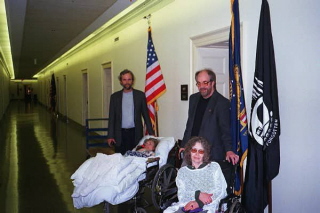
Jim and the late Cheryl Miller, with Gary Storck and Jacki Rickert, outside former US Rep. Bob Barr's office (photo from immly.org)
The bill, passed by the Senate's Health, Human Services and Senior Citizens Committee, would set up a registry program with the Department of Health and Senior Services for people with debilitating medical conditions, including cancer, glaucoma, HIV or AIDS, or other diseases that cause wasting, chronic pain, severe nausea, seizures, or severe and persistent muscle spasms. Registered patients or their caregivers could possess up to six marijuana plants and an ounce of usable marijuana.
The bill would also address what has been a thorny issue in some states that have approved medical marijuana laws: the question of supply for people who cannot grow their own. To address the supply problem, the bill foresees the licensing of collective gardens where patients could obtain medical marijuana.
Monday's hearing featured testimony from patients, experts, and drug reformers, as well as written testimony from the New Jersey Academy of Family Physicians, the New Jersey League for Nursing, the New Jersey chapters of the Leukemia and Lymphoma Society, and the New Jersey Hospice and Palliative Care Organization in support of the bill.
It began with an impassioned argument by Sen. Nick Scutari (D-Union County), the bill's original sponsor. "There is no price we would not pay, no limits to which we would not go" to prevent loved ones from suffering needlessly, Scutari told his colleagues on the Senate Health, Human Services and Senior Citizens Committee.
Scutari addressed opponents who argued that the state should wait for the US Food and Drug Administration to approve marijuana. "There is little comfort in the promise of a better drug 10 years from now," he said, noting that the federal government has ignored recommendations to conduct clinical trials with medical marijuana.
Dr. Denis Petro, a board-certified neurologist in neighboring Pennsylvania with a quarter-century of experience in neurology, clinical pharmacology, and marijuana research also testified. He told the committee how he conducted the first American study of marijuana's beneficial effects for multiple sclerosis (MS) patients 1981. It was time for New Jersey to approve a medical marijuana bill, he told the committee.
"There is no doubt that medical marijuana will eventually be allowed in New Jersey", said Kenneth Wolski, an RN, who with Jim Miller, the widow of New Jersey medical marijuana patient/activist Cheryl Miller, co-founded the Coalition for Medical Marijuana--New Jersey to press for such a bill five years ago. "There is too much logic, common sense, compassion and science that supports it. Logic says that doctors prescribe far more dangerous and addicting drugs than marijuana; common sense says that this issue ought to be decided in the privacy of the doctor-patient relationship, in the best interest of the patient; Compassion says that no patient should suffer needlessly; and there is a wealth of scientific evidence that supports the safety and efficacy of medical marijuana," Wolski concluded.
Although medical marijuana legislation had been offered each year since 2004, it had failed to move. But the Senate Health committee made up for lost time Monday, immediately voting to send the bill to the Senate floor with its stamp of approval. Patients and advocates were quick to thank the committee.
"It really brings me to tears, not just for me as someone suffering from multiple sclerosis, but as a registered nurse and for all the people that I've treated," said Elise Segal, who had testified in support of the bill earlier in the day.
"We want to thank the senators on the committee for voting for the New Jersey Compassionate Use Medical Marijuana Act," said Roseanne Scotti, director of the Drug Policy Alliance New Jersey office and a tireless campaigner in Trenton. "The bottom line is about compassion. If you or someone you love is seriously ill and none of the available medications relieved the suffering, wouldn't you want access to medical marijuana if a doctor recommended it? New Jerseyans overwhelmingly support this legislation and we are grateful to the committee for hearing their voices."
"I am pleased to see the support of the committee for Senate Bill 119," said Dr. Petro. "With passage of the legislation, patients with serious and life-threatening disorders can be offered a safe and effective alternative when conventional therapy is inadequate. The bill represents a positive step toward a rational policy regarding medical marijuana."
"I am thrilled that today members of the Senate Health Committee supported the common sense and compassionate response to suffering," said Nora Bertocci, a registered nurse and chair of the New Jersey Hospice and Palliative Care Organization, which works with sick and dying patients on a daily basis. "Medical marijuana is used very successfully in other states and in other countries. We should not be asking 'why should we legalize marijuana for medicinal purposes?' but rather 'why shouldn't we?'"
Since California led the way in 1996, 13 states have passed laws providing for the medicinal use of marijuana: Alaska, California, Colorado, Hawaii, Maine, Michigan, Montana, Nevada, New Mexico, Oregon, Rhode Island, Vermont and Washington State. Last month, Michigan voters made it the first Midwest state to join the list. If the New Jersey Assembly acts next year, it could become the first Mid-Atlantic state to join.
back to top
Dear friend and reformer,
As year's end approaches, I hope you will make a generous donation to support our campaigns in 2009.
 StoptheDrugWar.org traffic has grown at 60% per year for the past two years, as the chart to the left shows, most recently bringing over 170,000 people to our web site each month. But that is only part of what we are doing:
StoptheDrugWar.org traffic has grown at 60% per year for the past two years, as the chart to the left shows, most recently bringing over 170,000 people to our web site each month. But that is only part of what we are doing:
We are producing a short Internet video about the overuse of SWAT raids and the carnage that results, for people to send to their friends;
We are crafting a lobbying agenda for Congress based on pro-reform positions taken by President-Elect Barack Obama during his legislative career and campaign, and we are reaching out to new likely allies to support it;
We are preparing a major, one-week effort to educate the media about the effects of drug prohibition in the situations they report on; and
We are preparing the next major expansion of our web site, scheduled to launch around mid-year.
Your support plays a major role in deciding just how far we can take these campaigns. Please make a generous donation to support our campaigns in 2009. A tax-deductible donation to DRCNet Foundation will support our educational programs; a non-deductible donation to Drug Reform Coordination Network will support our lobbying work. Donations can be made online by credit card or PayPal, and you can also use our donation form to print out a convenient form to mail in. Or, you can send a check or money order instead to P.O. Box 18402, Washington, DC 20036. Contact us for info if you are interested in donating stock.
|
notepad folder:

one book we offer:
 |
As our thanks for your support, we continue to offer a wide range of books, videos and StoptheDrugWar.org gift items to members donating over certain levels --
visit our donation page to read the full list. Also, everyone donating before the end of the year will receive a complimentary StoptheDrugWar.org "Truth Campaign" notepad folder, and all donors will receive a StoptheDrugWar.org bumper sticker and a square StoptheDrugWar.org stop sign sticker, both being reprinted this month.
Drug policy reform is such an important issue, but it's an important issue that needs your help. We at StoptheDrugWar.org need you to ensure that this time of change, will bring needed change, for a disadvantaged, demonized and under-represented group in our society, the targets of the brutal War on Drugs. Please donate generously today, and together we will make things happen.
Thank you very much for working to change this country's drug policies and for continuing to be part of StoptheDrugWar.org. And thank you for giving your support to our efforts at this important hour. Your contribution has never been more important.

David Borden
Executive Director, StoptheDrugWar.org (DRCNet)
News & Activism Promoting Sensible Reform
P.S. Every day that goes by, 4,000 people are arrested for drug offenses, the vast majority of them minor, and half a million nonviolent drug offenders languish yet another day in the staggering number of prisons and jails the government has very unwisely built. It's time to stop this senseless tragedy and shocking injustice. Please increase your commitment to ending the drug war by donating to StoptheDrugWar.org today. Thank you!
back to top
Two cops are headed for prison in New Mexico, and one in California. Let's get to it:
In Albuquerque, New Mexico, two former San Juan County law enforcement agents were sentenced December 11 to six years in prison each for their roles in a drug distribution ring. Former New Mexico State Police Officer Keith Salazar and former San Juan County sheriff's deputy Levi Countryman each pleaded guilty earlier this year to a charge of conspiracy to distribute controlled substances. According to court documents, the pair took bribes from drug dealers to provide them with information about police, including the identities of snitches (confidential informants) and narcs (undercover officers).
In Santa Ana, California, a former California Highway Patrol officer was sentenced Tuesday to nearly six years in prison after he admitted stealing 64 kilograms of cocaine valued at $1 million from a CHP evidence locker. Joshua Wendell Blackburn, 33, pleaded guilty to possession of cocaine for sale of cocaine, transportation of cocaine, commercial burglary and a sentencing enhancement for possession of more than 40 kilograms of cocaine. Blackburn, a seven-year CHP veteran, broke into the evidence locker when other officers were called away to a late-night traffic accident and carted off three suitcases full of cocaine. He got caught when investigators figured out he was the only one near the evidence locker when the coke went missing. Blackburn's attorney said he was depressed over strife in his marriage.
back to top
Both the Ohio House and Senate voted this week for a bill, HB 215, which will, among other things, make salvia divinorum and its active ingredient, Salvinorin A, a Schedule I controlled substance with penalties the same as those for heroin, cocaine, or psychedelics. Gov. Ted Strickland is expected to sign the bill into law shortly.
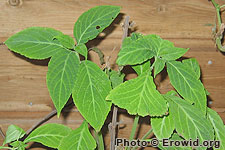
salvia leaves (photo courtesy Erowid.org)
The Ohio bill was sponsored by Rep. Thom Collier (R-Mount Vernon) after an incident where a 12-year-old Loudonville boy was shot and killed by another boy who had smoked the herb, a fast-acting, short-lived hallucinogenic member of the mint family. But while Collier repeatedly cited that tragic incident, as the
Columbus Dispatch noted: "There was no direct evidence, however, that the shooting was drug-related."
If Strickland signs the bill as expected, Ohio will be the sixth state to ban salvia outright, treating it as a proscribed substance. A handful of others, most notably California, have moved to restrict its sales, especially to minors.
While the Masatec Indians of Mexico have used the plant for religious purposes for centuries, it is only within the past few years that its psychedelic properties have become widely known among inner explorers and youthful experimenters in the US and elsewhere. Typically, some of those youthful experimenters post their tripped-out experiences on YouTube, where some legislator or drug cop or self-appointed watchdog eventually runs across them and demands that the plant be banned. Legislatures reflexively go along, with the ban bills typically passing with no organized opposition and by large majorities, as in this week's 90-4 Ohio House vote.
back to top
The American Civil Liberties Union (ACLU) Northern California chapter has joined with a small number of students and their parents in filing a lawsuit against the Shasta Union High School District, charging that its newly-expanded drug testing policy for students violates the state constitution. The move came after the district failed to act to address ACLU concerns over the new policy.

drug testing lab
Under previous district drug testing policy, only students involved in athletics were subject to suspicionless random drug testing. But earlier this year, the school board expanded the program to include students who participate in choir, band, drama and other competitive co-curricular and extracurricular school programs at the district's three main high schools. It also required students and their parents to consent to the drug testing regime in order for students to be able to use school computers.
Such requirements violate the students' right to privacy, equal protection, and to be free from unreasonable searches and seizures under the state constitution, the ACLU argued in its filing. The group and the plaintiffs seek an injunction blocking the drug testing program to avoid "irreparable harm" to the students.
But last week, the district was still talking tough. The district's new drug testing policy is "within the confines of the law," Superintendent Jim Cloney, who is named as a defendant in the law suit, told the Redding News. "We've discussed it," Cloney said. "The board chose to follow the policy as it's written."
The district doesn't have to waste its money defending an unconstitutional drug testing policy, said the Northern California ACLU's Michael Risher. "We are still... happy to speak with the district and try and resolve the issue," he said.
In the meantime, the Shasta school board can continue to throw away money as it tilts after windmills.
back to top
In yet another sign of the cross-currents buffeting the Netherlands' cannabis industry, a leading Dutch bank announced it was closing the accounts of people who owned coffee shops. The move comes as Dutch social conservatives, including members of the governing coalition, are making increasingly loud noises about criminality in the supply of cannabis to the coffee shops.

Postbank logo
Postbank announced the move last Friday. Part of the Dutch financial services giant ING Group, the Postbank has some 7.5 million private account holders and provides current and savings accounts, loans, mortgages, insurance, investments and pensions, making it one of the largest providers of financial services in the country. Postbank has no branches, but some services are available at post offices, and otherwise operates completely through land mail and telephone and electronic banking.
A bank spokesman said that facilitating the marijuana and hashish trade can no longer be considered responsible. In addition to closing existing accounts, the bank will now screen new customers to ensure they are not involved in the cannabis business.
Under Dutch practice for the past three decades, marijuana sales and consumption remains technically illegal, but tolerated in practice through the licensed coffee shop system. But the Dutch system does not provide for a legal source of supply to the coffee shops, thus providing an opening for organized crime groups to get involved.
The move by Postbank sparked an angry response from the coffee shop trade association, the Cannabis Retailers Union. The group condemned the bank for what it called a hypocritical and moralistic crusade. The retailers noted that the bank is not canceling loans or mortgages made to people in the trade because that could impact its bottom line.
back to top
With drug strategies and welfare reform plans in the British Isles moving toward pushing drug users into treatment and from treatment into the workplace, the British government is going to have to do a lot more to help drug users find jobs, a leading British drug policy think tank said in a report released this week. The report, Working Toward Recovery: Getting Problem Drug Users Into Jobs was published by the UK Drug Policy Commission and contains more than three-dozen recommendations aimed at easing the transition.
The report noted that while holding a job is a key component of drug user rehabilitation and integration into society, about 80% of problem drug users were unemployed. (The report defined "problem drug user" as someone dependent on heroin or crack cocaine.) And while government strategies in England, Scotland, and Wales are to get users off drugs and into jobs, the strategies are undeveloped and, and employer practices sometimes counterproductive.
In particular, the report criticized the informal "two years drug free" rule used by many employers. With the two years of abstinence including abstinence from opiate substitute medications, such as methadone, the practice is unduly harsh and unnecessary, given that many people on the controlled drug regimen have already achieved the stability employers say they want.
Employers are unlikely to want to hire problem drug users, with only 26% saying they would be prepared to hire a former drug user. Employers cited several types of risk associated with drug users -- from continuing drug use, to the firm's reputation, and to the firm's customers and employees -- and about three-quarters of them they needed more government help in developing risk assessments, support for drug using employees, and information about indemnity insurance.
The Labor government's welfare reform proposals will tie money to pay for drug treatment to drug users agreeing to a rehabilitation plan, the study noted. But with employment a big part of rehabilitation, the government is going to have to provide incentives and programmatic support if it is going to force those drug users into the job market.
back to top
Although marijuana use in Japan occurs at dramatically lower rates than in Europe and the United States, police and at least one newspaper are raising the alarm. On Saturday, the newspaper Mainichi reported, as its headline put it, Japan Grappling With Cannabis Crisis.
The newspaper cited a number of prominent recent marijuana busts in announcing the crisis. They have included university students, sumo wrestlers, actors, and professional sportsman, and almost all were for possession or use of small amounts of marijuana. It also cited an increase in the number of cultivation arrests.
Here are the hard numbers behind the "crisis": Since 1998, the number of people arrested for marijuana cultivation has increased four-fold... to a whopping 192, according to the Kinki branch of the Ministry of Health, Labor and Welfare's Compliance and Narcotics Division. Last year, police arrested 2,373 people on marijuana charges. By comparison, in the United States, which has roughly 2 1/2 times the population of Japan, more than 800,000 people were arrested on marijuana charges last year.
Under Japan's Cannabis Control Law, possession of even small amounts of marijuana can garner a five-year prison sentence, and selling it can earn up to seven years. There is no formal sanction for consumption, but the Health Ministry pointed out that people smoking together can and have been charged with joint possession. (No pun intended.)
Mainichi relied heavily on the Health Ministry narcs for its information. "There's no need for syringes, and it has this sense of cool to it. For newcomers to drugs, the barrier is low," the ministry said, attempting to explain the plant's allure. The ministry also warned that THC "can cause hallucinations" and that marijuana "is also known as a gateway drug."
Seeking to balance its account, the newspaper also came up with a Nagasaki International University professor of pharmaceutical resources who reprised a few more old canards. "It's more carcinogenic than tobacco, so to say there's no health effect is a big mistake," warned Yukihiro Shoyama. "Repeated use can also cause a motivational syndrome, similar to chronic lethargy, and deterioration of memory."
And if that weren't bad enough, the ministry narcs emphasized the dangers of getting busted. "Arrest, dismissal, expulsion from school... With the risk of collapsing those things that make up your life, isn't the risk of smoking cannabis too high? Think it over, and you should know the answer," said one investigator.
It looks like it's time for a Japanese NORML affiliate.
back to top
In a Sunday interview, Venezuelan President Hugo Chávez said relations between his government and the US could improve dramatically under an Obama administration, including renewed cooperation with the DEA. Chávez, whose relations with the Bush administration have been tense and confrontational, threw the US anti-drug agency out of the country in 2005, charging it with spying and interfering with Venezuela's internal affairs.
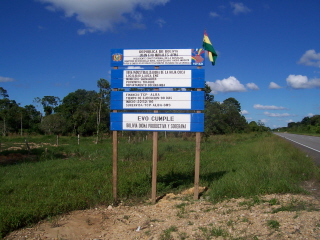
Chapare region, Bolivia, sign announcing construction of coca leaf industrialization plant financed by Venezuela (photo by Chronicle editor Phil Smith)
"There are winds in favor of relations between the Venezuelan government and the new president of the United States, Barack Obama. We must try energetically and with good faith to improve relations, and I am ready to do it," Chávez said on a Sunday political talk show, José Vicente Today, broadcast on a private television station. "But we can't be naïve," Chávez continued. "Worse than relations under Bush, impossible, but we must be cautious because Obama is the president of the empire, and all of its machinery is still intact."
The Bush White House has accused Venezuela of turning a blind eye to the trafficking of cocaine from neighboring Colombia -- a US ally and the world's largest producer -- but that is one of several areas where friendlier, more respectful relations could lead to renewed cooperation, Chávez said. "We are ready to work government to government on the energy issue, to combat drug trafficking," Chávez said. "We could even create a new agreement with the Drug Enforcement Agency."
But cooperation is a two-way street. Chávez is deeply interested in seeing fugitive terrorist Luis Posada Carriles extradited to Venezuela to face trial in the 1976 bombing of a Cuban airliner that killed 73 people. Posada escaped from a Venezuelan prison and showed up in the US years later, but US officials have refused to extradite him.
On Saturday, Chávez called on Obama to extradite Posada Carriles. "President Obama, send us the terrorist that we're requesting. He should be in prison and not free on the streets of the United States," Chávez declared.
back to top
December 24, 1912: Merck patents MDMA. Its psychoactive effects remain unknown for more than 60 years, but the drug eventually becomes popularized under the slang term "ecstasy."
December 20, 1989: The US invades Panama with 24,000 soldiers in Operation Just Cause in order to overthrow dictator Manuel Noriega for drug trafficking, money laundering, and selling information to Cuba.
December 25, 1994: The Buffalo News reports, "Troubled with three long-term sentences he felt forced to make in recent weeks, US District Judge John T. Curtin says he will stop hearing drug cases in the coming year rather than continue to be part of a system of punishment that 'just isn't working.'" Curtin says he would rather see the federal government spend more money on education, counseling, and drug prevention programs, rather than towards putting people in prison. "You don't even have to think of it in moral terms. In financial terms, it just isn't working," Curtin said.
December 23, 1995: A British Medical Journal editorial entitled "The War on Drugs" states, "The British government's drug strategy for the next three years states baldly 'There will be no legalisation of any currently controlled drugs.' But some legalisation would help."
December 24, 1998: The Times (UK) reports that the Prince of Wales expressed an interest in the effectiveness of cannabis in relieving the pain of diseases such as multiple sclerosis. During his annual visit to the Sue Ryder Home in Cheltenham, Gloucestershire, he asked MS patient Karen Drake: "Have you tried taking cannabis? I have heard it's the best thing for it." Drake, 36, said afterwards: "I was surprised but I think I would like at least to try it. Anything that can help relieve the pain can only be for the good."
December 24, 2001: The North Carolina Lexington Dispatch reports the dismissal of 65 criminal cases investigated by three county narcotics officers charged in a federal indictment with conspiracy to distribute drugs. According to a federal affidavit issued in the case, law enforcement officers abused their authority in one or more ways, including writing fake search warrants, planting evidence and fabricating charges, keeping drugs and money seized during arrests, attempting to extort more money from the people arrested, and intimidating suspects and potential witnesses.
December 19, 2003: Albert A. Gore III, 21, is arrested for marijuana possession after being stopped for driving a vehicle without its headlights on.
December 22, 2003: The Annenberg School for Communication (ASC) at the University of Pennsylvania releases a report on the Office of National Drug Control Policy's National Youth Anti-Drug Media Campaign. ASC was contracted by ONDCP to analyze the campaign as a whole and their work on marijuana specifically. ASC found there is little evidence that the tens of millions being spent every year are having any discernible impact on use of or attitudes toward marijuana among the nation's youth.
December 25, 2003: The Philippine Star reports that the campaign to rid the island of drugs by 2010 has resulted in cramming jails and paralyzing the justice system.
back to top
Webmasters: Please post StoptheDrugWar.org's new 469x61 pixel banner on your web site to help grow the movement!

The image can be downloaded from this page, or from http://stopthedrugwar.org/files/banner-stdw-469x61.jpg -- or just paste the following code into your web pages:
<a href="http://stopthedrugwar.org" target=_blank_><img src="http://stopthedrugwar.org/files/banner-stdw-469x61.jpg" height="61" width="469"></a>
Many of our supporters still have links up that point to our old domain, drcnet.org. If you are reading this, we request that you update your links to point to StoptheDrugWar.org instead. By making that change you will be helping our rankings in search engines, so that even more people will find us than do now.
We wish to thank AlterNet for donating both advertising and banner design to us, and for their frequent inclusion of our articles on their drug policy site, the DrugReporter.
back to top
Along with our weekly in-depth Chronicle reporting, DRCNet also provides daily content in the way of blogging in the Stop the Drug War Speakeasy -- huge numbers of people have been reading it recently -- as well as Latest News links (upper right-hand corner of most web pages), event listings (lower right-hand corner) and other info. Check out DRCNet every day to stay on top of the drug reform game! Check out the Speakeasy main page at http://stopthedrugwar.org/speakeasy.

prohibition-era beer raid, Washington, DC (Library of Congress)
Since last issue:
Scott Morgan writes: "Am I a Hippie Who Doesn't Understand Politics?," "The Profit Motive for Arresting Marijuana Users," "Shooting Down Innocent People in Airplanes Won't Win the Drug War," "Day One at the UN Drug Treatment Meeting -- Slightly More Interesting Than Predicted," "When it Comes to Marijuana Laws, Obama's Website Should be Called Same.gov," "High School Seniors Are Using Lots of LSD This Year," "More on the Ryan Frederick Case," "New Jersey Medical Marijuana Bill Gets Favorable Committee Vote," "Why Should You or Anyone Care About This Week's UN Anti-Drug Meeting?," "The Real Reason Obama Won't Support Marijuana Legalization," "Asserting Your Rights Doesn't Mean You're Getting Away With Something."
David Guard posts numerous press releases, action alerts and other organizational announcements in the In the Trenches blog.
Please join us in the Reader Blogs too.
Again, http://stopthedrugwar.org/speakeasy is the online place to stay in the loop for the fight to stop the war on drugs. Thanks for reading, and writing...
back to top
StoptheDrugWar.org (DRCNet) is seeking enthusiastic volunteers for two important purposes:
Membership Drive: Do you live in Washington, DC or nearby? We need help from friendly drug reform enthusiasts who are willing to spend a couple of hours helping with our year-end member mailing and our membership phone drive. Most volunteer shifts are on Tuesday, Wednesday or Thursday evenings, but the office will also be open this Sunday afternoon, next Monday daytime and evening, and possibly Tuesday evening before breaking for the holidays. Efforts will continue into 2009. Come on out, enjoy free pizza and other snacks, make new friends, and help raise needed funds for the cause while gaining valuable volunteer experience. E-mail [email protected] or call us at (202) 293-8340 ext. 302 for further information or to sign up.
Writers:StoptheDrugWar.org is carrying out an ambitious week-long writing-based campaign dealing with the mainstream media's coverage of drug issues -- preparatory work is now underway with the help of volunteers -- and we are seeking to expand our team of volunteer writers who want to be part of it. Along with writing skills, volunteers for this project should have a fairly good understanding of the effects of drug prohibition -- visit our Site Map page and scroll down to the "Consequences of Prohibition" section to get an idea of what we mean by that. Contact David Borden at [email protected] or by replying to a Chronicle email, or by phone at (202) 293-8340 ext. 301, for further information about this very exciting effort.
back to top
Want to help end the "war on drugs," while earning college credit too? Apply for a DRCNet internship for this spring or summer semester and you could come join the team and help us fight the fight!
DRCNet (also known as "Stop the Drug War") has a strong record of providing substantive work experience to our interns -- you won't spend the summer doing filing or running errands, you will play an integral role in one or more of our exciting programs. Options for work you can do with us include coalition outreach as part of the campaign to repeal the drug provision of the Higher Education Act, and to expand that effort to encompass other bad drug laws like the similar provisions in welfare and public housing law; blogosphere/web outreach; media research and outreach; web site work (research, writing, technical); possibly other areas. If you are chosen for an internship, we will strive to match your interests and abilities to whichever area is the best fit for you.
While our internships are unpaid, we will reimburse you for metro fare, and DRCNet is a fun and rewarding place to work. To apply, please send your resume to David Guard at [email protected], and feel free to contact us at (202) 293-8340. We hope to hear from you! Check out our web site at http://stopthedrugwar.org to learn more about our organization.
back to top

